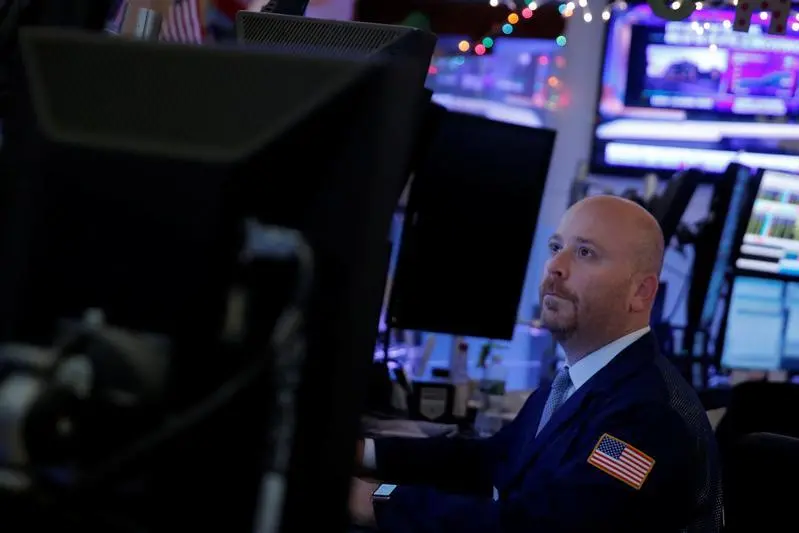PHOTO
Global markets
Asian markets fell sharply in early trading on Tuesday as the trade war between China and the United States showed signs of intensifying, with U.S President Donald Trump threatening to impose 10 percent tariffs on a further $200 billion worth of Chinese goods, and China immediately threatening further retaliation.
Shares in Asian equities fell to a four-month low in early trading on Tuesday, with MSCI’s broadest index of Asia-Pacific shares outside Japan dropping to its lowest level since February. The index fell by 1 percent as Chinese shares traded much lower. The Shanghai Composite Index had fallen by over 2.5 percent by 0409 AM BST, while Hong Kong's Hang Seng index dropped by 1.9 percent.
“A U.S.-China trade spat alone won’t hurt global growth. But there is always potential for Trump to keep increasing his threats which could have broader implications," Kota Hirayama, a senior emerging markets economist at SMBC Nikko Securities in Tokyo, told Reuters. "Increasing trade has helped growth in emerging markets and this could be negatively affected.”
The fall in Asian markets followed on from declines both on Wall St and in Europe on Monday. Although the Nasdaq Composite remained largely flat, the Dow Jones Industrial Average fell by 0.4 percent and the S&P 500 dropped 0.2 percent.
In Europe, both the STOXX 600 Index and Germany's DAX fell by 0.8 percent on Monday. One big gainer, however, was Norwegian Air, whose shares jumped by 10.1 percent following comments made by the CEO of German airline Lufthansa, Carsten Spohr, to the Süddeutsche Zeitung newspaper. Spohr said that it had been in contact with Norwegian's management, with the latter also attracting interest from British Airways owner IAG.
Middle East markets
Most of the Gulf's exchanges remained closed as a result of the Eid Al Fitr holidays, but markets in the United Arab Emirates fell, with the Abu Dhabi Securities Exchange dropping by almost 2.7 percent and Dubai's Financial Market falling by 1.8 percent as most stocks fell.
Air Arabia was one of the biggest fallers. The Sharjah-based airline saw its stock close 7 percent lower due to fears about its exposure to the Abraaj Group - the Dubai-based private equity firm whose parent entity has filed for provisional liquidation in the Cayman Islands to stave off creditor claims. Abraaj's chairman, Arif Naqvi, also sits on Air Arabia's board.
The airline confirmed that it had an investment in Abraaj funds on Monday. In a statement to Reuters, the company said that it was "actively engaged with all stakeholders and creditors involved with the matter to ensure Air Arabia's investment and business interest is protected".
Shares in ports operator DP World also dropped by 3.2 percent on Nasdaq Dubai on Monday.
The company had issued a statement on Saturday denying reports that it was considering an out-of-court settlement with the government of Dijbouti, which had suddenly cancelled DP World's contract to run a container port at Doraleh in February.
DP World said in its statement that the case is still subject to legal action at the International Court of Arbitration in London, and that it was awaiting the outcome of its ruling.
Shares in blue chip developer Emaar Properties also fell by just over 3 percent, while construction companies Arabtec, Drake & Scull and Orascom Construction also witnessed declines in value of more than 3 percent of their Dubai-listed stocks.
In Abu Dhabi, several bank shares finished lower, with First Abu Dhabi bank declining in value by 3.6 percent. Waha Capital's shares finished 4.5 percent lower. Sources told Reuters last week that the asset management firm had abandoned plans to raise a $300 million private equity fund as investor sentiment worsened towards Middle East private equity funds due to the negative publicity surrounding Abraaj Capital, which is the region's biggest private equity player.
Currencies
Both the US dollar and the Chinese yuan fell as a result of the dispute, while the Japanese yen gained as a result of its perceived status as a safe haven. The dollar fell almost 0.5 percent against the yen to 110.02. The yuan also fell against the dollar in the ofshore market to 6.466 per dollar, which was its weakest level for five months.
Commodities
Oil prices continued to fluctuate due to speculation ahead of Friday's OPEC meeting, with Brent crude falling back by 0.64 percent to $74.86 by 0443 BST following overnight gains of 2.5 percent. Prices of U.S. West Texas Intermediate oil also dropped by 0.49 percent to $65.53 per barrel.
Gold prices rallied on the back of heightening trade tensions, with spot gold gaining 0.24 percent to $1281.04 and silver prices rallying by 0.79 percent to $16.53.
Trade dispute fears also hit the price of crops. U.S soybeans, which have already been the subject of a 25 percent tariff from China, fell by 2 percent, while corn prices dropped by 1.8 percent.
Gain a deeper understanding of financial markets through Thomson Reuters Eikon.
(Writing Michael Fahy; Editing by Shane McGinley)
A new version of the Trading Middle East newsletter is being launched on June 27, 2018. To keep receiving the newsletter after this date, please subscribe using this link.
Our Standards: The Thomson Reuters Trust Principles
Disclaimer: This article is provided for informational purposes only. The content does not provide tax, legal or investment advice or opinion regarding the suitability, value or profitability of any particular security, portfolio or investment strategy. Read our full disclaimer policy here.
© ZAWYA 2018




















